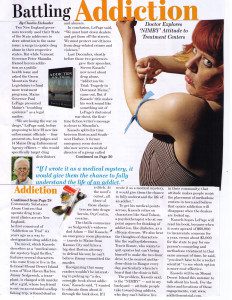History repeats itself, unless we learn from prior experiences. This is true in many aspects of life, and unfortunately it takes a toll on all of us in terms of individual and community well-being and longevity of life. This is evident not only in the wars that are fought around the world, but in our approach to medical care. Knee jerk reactions have no place in medical decision making, and especially not by politicians who choose to ignore the data of scientifically proven treatments. This is why I felt compelled to speak out about the recent legislative proposal in Maine to limit treatment options for opiate (Heroin & OxyContin) addiction.
This is also why I wrote the book, Addiction on Trial – to demystify and destigmatize the disease of addiction, but through the back door to reach a wider group of readers. The book is written in a “novel” approach, as a murder mystery/legal thriller based on medical and legal truths – which will entertain, enthrall and educate; and I am appreciative of the 4.9 star Amazon rating. I hope you will enjoy both my Op-ed below as well as my page turning thriller, Addiction on Trial.
Thank you and please spread the word that repeating historical mistakes with politically motivated knee jerk reactions needs to end!

Steven Kassels: Drug addiction is a medical issue, not a political issue
By Steven Kassels
Lewiston Sun Journal: Published on Sunday, Feb 8, 2015 at 12:12 am
We, as a society, have arbitrarily differentiated between acceptable and unacceptable drug addictions. Why else would our politicians enter into medical decision making?
After 50 years of accepted science, we know that the cost of not treating opiate addiction is up to 12 times greater than the cost of the treatment itself (National Institute of Health). Likewise, the benefits of having multiple medications available to treat various illnesses (patients respond differently to treatment regimens) have been well documented.
So why do some politicians want to insert themselves into the medical world and make arbitrary decisions about which medications to pay for when it comes to the disease of addiction, particularly when the political decisions fly in the face of medical science?
For those who want to believe addiction has no biological, psychological or sociological components (like the disease of diabetes), surely you will agree that abusing substances can cause disease. It is commonly accepted that Vice President Dick Cheney smoked way too many cigarettes (nicotine addiction) and Hall of Fame baseball player Mickey Mantle drank way too much beer (alcohol addiction). To one we gave a mechanical heart, followed by a heart transplant, and to the other we gave a new liver. They had “acceptable” addictions.
But how about the Vietnam veteran who came home addicted to heroin? Or young men and women who become addicted to painkillers after suffering some type of accident? Are there really “good addictions” and “bad addictions”? Is there really a difference between addictions?
If the differences are so great, why does the medication naltrexone decrease cravings in alcoholics and also block the effects of heroin? Are the addictions really all that different?
Why does methadone treatment still carry such stigma? And why are some politicians in Maine considering defunding it? Is that based in science or bias?
If we look back in history, it was President Richard Nixon who stated in 1971, “ ... methadone is a useful tool in the work of rehabilitating heroin addicts, and that tool ought to be available to those who must do this work” (Special Message to the Congress on Drug Abuse Prevention and Control). And in 1999, Mayor Rudy Giuliani — a mayor as tough on crime as any modern politician — initially recommended ending methadone treatment in New York, but upon review of the scientific data, he reversed his decision (Mayor Relents on Plan to End Methadone Use). Science won out.
By contrast, have you ever heard of politicians trying to prohibit coverage for other medications, such as Valium, because they have addictive qualities and thereby limiting doctors’ ability to treat certain illnesses? Have our politicians ever decided that people who smoke cigarettes should not get blood pressure medications because the condition is self-inflicted, chronic and might last years or decades?
Why do we have a heroin and opiate epidemic? We can blame doctors; we can blame pharmaceutical companies; and we can even blame our elected officials who decided to go to war in Afghanistan (U.S.’s $7 Billion War on Drugs Helped Grow Afghanistan’s Heroin) — but blame gets us nowhere.
Our focus should be a doubling of effort to limit the demand for drugs, and the way we limit the demand is through treatment. Incarceration, which is the failed and more expensive approach proposed by some politicians in Maine, just leads to a revolving door.
Some Maine politicians are also trying to claim that treatment with the medication Suboxone — which is a costly prescription medicine often provided through doctors’ offices, is superior to its less-costly relative Methadone — which is provided through heavily regulated clinics that are required to offer counseling and screening services to patients.
But, this is another political approach to a medical issue, and is short on science. Suboxone not only has a ceiling effect that makes it ineffective for many patients, it also has no mandatory requirement for patient counseling that is essential to effective addiction treatment.
We must remember that not all patients are the same, and every patient does not respond the same. Suboxone works for some and methadone is better for others. Should our politicians enter into the practice of medicine by defunding methadone, which is considered the gold standard for opiate addiction treatment?
Much has been made of government not getting involved between a doctor and a patient. I find the current proposal to defund methadone just that.
We cannot let decisions be based on fear, bias or a lack of understanding scientific studies. NIMBY does not work. Opiate addicts live in our communities and in our families, and they work in our businesses.
Politicians should not practice medicine, and they should not defund methadone. Treatment with this scientifically proven medication is fiscally responsible, and cutting it will put patients back on the street, increase crime, jeopardize public health and raise our taxes.
That is bad medicine for Maine.
Steven Kassels, MD, has been board certified in emergency medicine and addiction medicine. He serves as medical director of Community Substance Abuse Centers in Lewiston and Portland, and is the author of “Addiction on Trial — Tragedy in Downeast Maine.”


